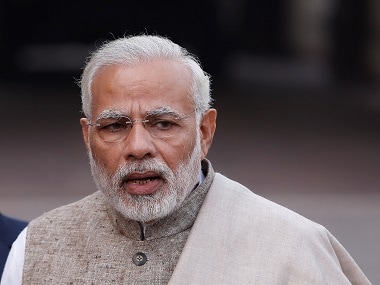Fake news in media is something we will have to live with for now. It does not matter if Prime Minister Narendra Modi rolls back the Information and Broadcasting minister Smriti Irani’s knee-jerk diktat on journalists being suspended for six months if their stories are studded with non-facts and shunned forever if found guilty for a third time. Clearly, the government was not on the same page and Irani had her wrists slapped. [caption id=“attachment_4416713” align=“alignleft” width=“380”]  File image of Prime Minister Narendra Modi. Reuters[/caption] Modi realised the can of worms this sort of arbitrary and hostile act would open. There is a supreme difference between getting a fact wrong in an endeavour to uncover the truth and innuendo, half-truths, surmises and blatant rumour. And this is where Irani erred. In India, accredited journalists are a tiny percentage of the journalistic milieu. They are limited to those who attend or cover government events. Her call to arms ignored the rest where the rot is truly deep. Such a draconian option as to freeze a career because of an honest error is giving the government an undemocratic and almost despotic power to display its ire against all criticism and engage in playing favourites. The premise of ‘I do not like what you wrote so you shall be cast upon the waters’ not only comes into play, it becomes paramount. Most professionals take pride in getting their ducks in a row. But being human, errors can be made in isolation. You can get a date wrong, a name misspelled, and a location incorrect. It happens. But it is mutually exclusive from the chase so to speak and does not detract from the indictment of corruption, malfeasance, breach of promise, collapse of trust, conduct unbecoming or whatever else the act of omission or commission is. If Irani had gotten away with it, she was planting a poisonous seed into the fourth estate… but it has to be asked: Is the media sitting up and begging for it? Did she have a point? Regardless of Modi rescinding the order, there is considerable irony in the Information and Broadcasting Ministry’s move. Much of the gossip and the fake information emanates from the corridors of power where vested interests leak hints of what might not be. Newspapers and websites still remain concerned about errors, but the same does not hold good for television which has run away with the truth and eclipsed even Pontius Pilate. Between willing motor mouths and an audio-visual media which has gone berserk, fake news is a marketable commodity. However, government cannot legislate against it by capturing those who cover its activities (Smriti is looking in the wrong place) and must use the same avenues it concedes to other victims of media harassment including the citizens. Go to court, sue the channel or paper or complain to the Editors Guild of India or the Press Council of India. That should be the recourse and if the rich and the powerful find it cumbersome, too slow, and too time-consuming then laws must be passed to help media police itself and possess more power to chastise. Unless, like the physician, we are prepared to heal ourselves the authorities will usurp our rights because we are allowing our own to run rampant and wreck our credibility. Irani may have been cut to size but misuse of its organs by media is a growing menace and this dismissal by Modi is a stopgap relief. However, if we do not stop tolerating affection for this genre of reportage in our ranks there will be another day, another Smriti Irani and a prime minister who will say enough is enough and sign the order. And we will all have to pay the price. And become like Malaysia where fake news gets you six years.
. It does not matter if Prime Minister Narendra Modi rolls back the Information and Broadcasting minister Smriti Irani’s knee-jerk diktat on journalists being suspended for six months if their stories are studded with non-facts and shunned forever if found guilty for a third time. Clearly, the government was not on the same page and Irani had her wrists slapped.
Advertisement
End of Article


)

)
)
)
)
)
)
)
)



